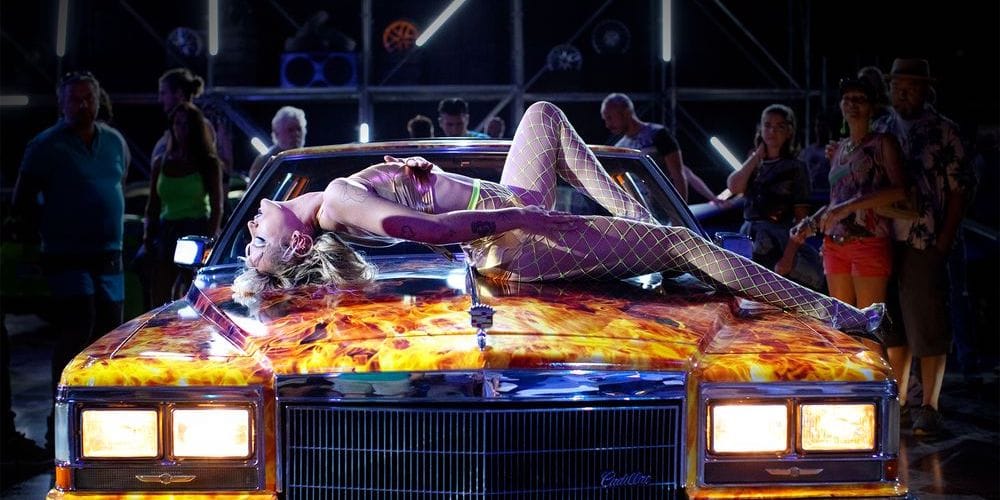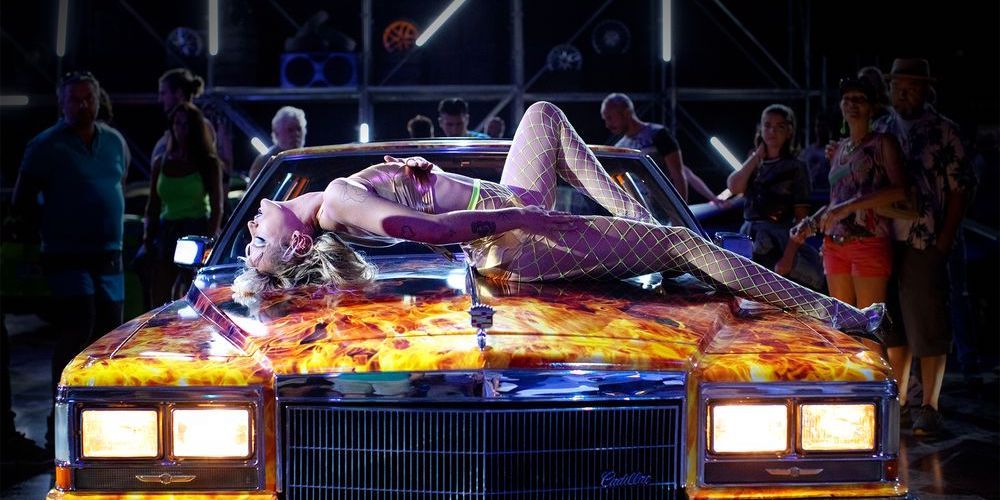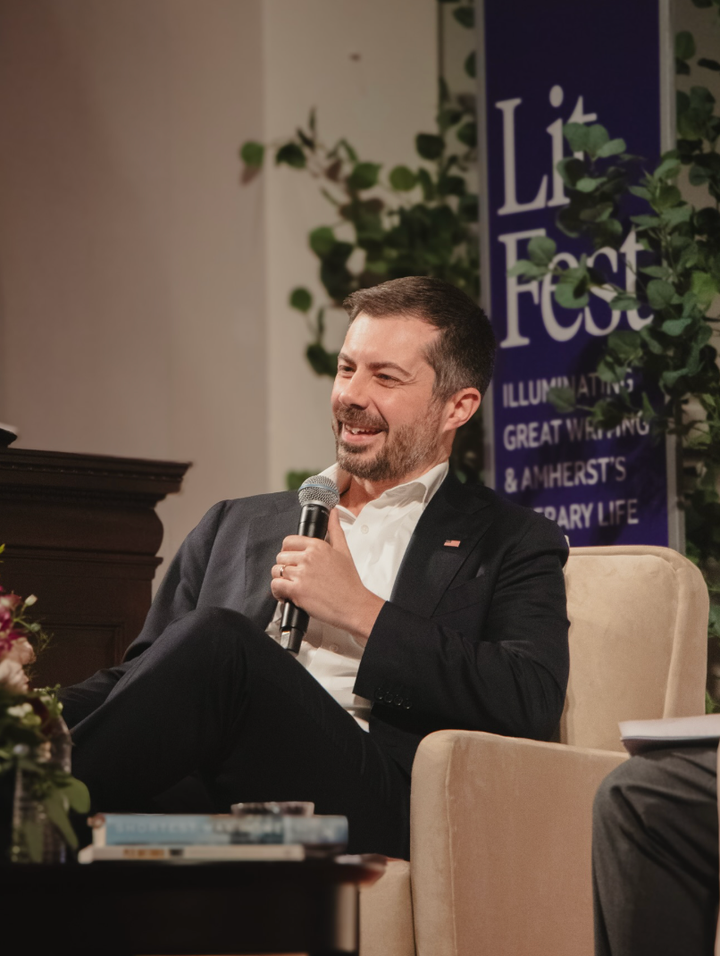A Visceral Vision of Love: Ducournau's "Titane" Shocks
"Titane," Julia Ducournau's new Palme d'Or winning film, explores the connections between humanity and machines — often in gory detail. Staff Writer Miles Garcia '25 shares his reactions to the body horror movie and its surprisingly heartwarming core.


In the world of French filmmaker Julia Ducournau’s Palme d’Or-winning film,“Titane,” humans are appliances. They work and move like cogs in a machine without a sense of agency. Set in a future where even the natural movements and reactions of humans seem programmed, “Titane” highlights the small insidious ways technology has creeped into daily life. While their movements may resemble gears in a clockwork system, the film’s characters don’t come off as robotic or lacking empathy. It’s quite the opposite: this is the most brutal, heart-wrenching, soul-crushing film of the year.
The emotional power of the story comes from its willingness to show everything and tell nothing. The film is clean of unnecessary dialogue, and presents information through sparse, efficient symbolism. For example, we see the main character Alexia (Agathe Rousselle) — a near-mute serial killer with a past cloaked in mystery — perform at a strip club where fancy, expensive cars dance alongside the women. Both are objectified into material, metallic substances. It isn’t long before the physicality of people and that of their futuristic contraptions become deeply intertwined. People have blood; cars have oil. What’s the difference, really?
The film executes complex metaphors like this without needing to give every detail. For this reason, every scene feels climactic and beautiful. What’s more, the lush, colorful cinematography gives every surface a tactile feel and breathes life into this fictional world that reeks of decay and destruction. “Titane” contains a deep visual lore that, while never fully explained, gives immense materiality to every scene.
And most of these scenes are unbearable to watch. The leg of a stool goes through someone’s mouth, cracking their jaw open. A character forces herself to break her nose on a bathroom sink. To scare off an unwanted predatorial man, Alexia lodges her needle-like hairpin in his ear. The extreme violence always emerges from the erratic mental state of Alexia, revealing more about her character and how far into madness she’s willing to go to save herself.
If reading those examples made you gag, you are no more faint-of-heart than the people who walked out of my own screening of the film. But if you can stomach it past the 30-minute mark, “Titane” will not only make you gag but will also remove your heart from inside your chest and present it to you, beating and bloody.
It is precisely because of the film’s willingness to show brutality that its tender second and third acts feel so pure and full of love. I hesitate to describe the film’s plot any more than I already have because the experience is so much more powerful knowing as little as possible. Suffice it to say that when Alexia feels unloved by her family, she finds another that can fill those gaps. She attempts to shed her virulent persona and accept the love surrounding her. These high emotions feel just as violent as the physical barbarism. In one scene, an embrace between two characters contains just as much tension as there must be in Alexia’s fists when she attacks someone in an earlier scene.
Credit must be given to the actors, who lean fully into the darkness of their characters. Agathe Rouselle plunges deep into Alexia’s disquieting mystery, making it seem like Alexia’s entire life is visible before us. The childlike look in her eye or the shivers that run down her spine in uncomfortable public settings are just a few ways in which Rouselle makes her character tangible. These details in the performances turn what might otherwise be unredeemable characters into disturbed visions of humanity’s most ominous nooks and crannies. Neither emotion nor brutality are censored or held back in any way. For me, that made for a lasting impact. Just thinking about the final scene while writing this, I teared up immediately.
“Titane” deals with complex social issues too urgent for it to simply explain. There are themes of gender identity, incest, trauma, the fallout of a defective childhood, objectification and resilience. But “Titane” does not need to intellectualize its subject matter. Instead, Ducournau uses language and cinematography to their highest capacities to make these issues feel as urgent as they are. The film never cuts away from the brutality on screen and isn’t afraid to put the camera and the viewer directly inside the horror that ensues. It demonstrates the abject, inescapable crisis that is the world we live in today, with a magnetic force that did not let up.
But what at first seems like a chokehold turns into a delicate, caring hug. The film has a visceral quality that extends toward the viewer, inviting participation and investment like a lonely, attention-seeking child. Its body grows before your eyes. “Titane” has bone, muscle, a nervous system, skin, breath, fingernails and fluids. It is a living entity. How is it possible to relate to a film so disturbing and vile? It’s because deep down, we have the same disturbing and vile qualities. Our hands are capable of committing the same atrocities as displayed in the film. The viewer feels complicit in these events because, considering the manner in which Alexia was raised, it is no wonder she feels forced to lash back at the world that screwed her up just the same. “Titane” confronts our capacity to perpetrate the most inhumane acts and our ability to feel the effects of these moments deep in our souls. The film is listed as “body horror” for a reason.
The line between function and instinct is difficult to discern. How much of our internal selves are the result of hormones, memories, knee-jerk reactions and primal operations, things we can’t control? And what decisions can we really make given our circumstances? “Titane” reminds us of our own beating hearts. Its thesis is that love reigns at the center of our being, but not in a place safe from change. It can become twisted and feral if tampered with. It can lead us down paths of rampage and abandon and unruly bloodshed. Love is the most violent emotion. And coming to terms with the reality of that violence will help us survive through a harsh world that needs love most.





Comments ()